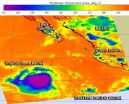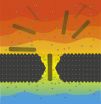(Press-News.org) WASHINGTON (Sept. 26, 2014)—A new global analysis released today by the National Geographic Society and GlobeScan finds that concern about environmental problems has increased in most countries surveyed, and that more people now expect global warming will negatively affect them during their lifetime than in 2012. Despite this, National Geographic's Greendex, a comprehensive measure of consumer behavior in 65 areas related to housing, transportation, food and consumer goods, shows that sustainable consumer behavior has only grown slowly.
Results of the 2014 Greendex, a collaboration between National Geographic and global research consultancy GlobeScan, were released today in Boston at the Sustainable Brands New Metrics '14. Greendex 2014 surveyed 18,000 consumers in 18 countries and is the fifth iteration of the survey, which was first fielded in 2008.
Among the top findings in 2014:
Environmental concern has increased since 2012: Sixty-one percent of consumers globally now say they are very concerned about environmental problems compared with 56 percent in 2012.
Compared to the study's 2008 baseline, sustainable consumer behavior has increased in nearly every country tracked since the first survey, suggesting consumer behavior across the world is improving, albeit slowly.
Environmentally friendly behavior has increased in nine of the 17 countries that were surveyed in 2012: Argentina, Australia, Hungary, India, Mexico, Russia, Sweden, South Korea and Great Britain. However, sustainable behavior decreased since 2012 among consumers in five countries: Canada, China, Germany, Japan and the United States.
Top-scoring consumers of the 2014 Greendex study are in the developing economies of India and China, followed by consumers in South Korea, Brazil and Argentina. Indian and Chinese consumers also scored highest in 2012.
U.S. consumers' behavior still ranks as the least sustainable of all countries surveyed since the inception of the Greendex study in 2008.
More and more consumers are embracing local and organic foods and lightening their environmental footprint in the food category. Nearly all consumers believe that we need to change the way we produce and consume food in order to feed a growing population, and many say it is very important to know how and where their food is produced. Yet, relatively few people report that they do.
Consumers are anxious about climate change: Fifty-one percent across the 18 countries surveyed in 2014 believe that global warming will negatively affect their own lives, up in seven surveyed countries from 2012 and down in none.
Furthermore, 65 percent of consumers overall believe that most scientists are convinced that human activity causes climate change.
The complete results of the Greendex are online at http://www.nationalgeographic.com/greendex.
"National Geographic developed the Greendex as an important tool for measuring sustainable behavior and changes in behavior around the world over time," said Terry Garcia, chief science and exploration officer at the National Geographic Society. "The 2014 Greendex provides increased insight into what the drivers are for consumers to engage in more environmentally friendly behavior, such as peer influence and helping people see the connections between humans and the environment. This year we have seen that, although change is coming slowly, consumers are showing positive change in their attitudes about sustainable food choices; this data can help inform behavior change in other sectors."
Eric Whan, who directs the Greendex project at GlobeScan, added, "It's vital that all actors work together to enable substantive reductions in the environmental impact of consumer behavior around the world. The research underlines that consumers need more encouragement from peers as well as enablement and better leadership from companies and governments to lighten their own impact. That's why the Greendex is so important."
The Greendex was launched in 2008 to inform consumers worldwide and motivate sustainable choices. It explores individual consumer behavior and material lifestyle of 18,000 consumers in 18 countries around the world (14 in 2008), and measures the specific choices and behaviors that contribute most to a consumer's overall ecological impact — for example, the type of car you drive, the way you heat your house, the kind of foods you eat. A complex algorithm is applied to results to generate an index score — a Greendex score — for each individual respondent, which reflects the relative environmental impact of his or her consumption patterns. Individual scores are averaged to create a mean score for consumers in each country. Combined with questions about cultural drivers and perceptions, the Greendex gives a comprehensive view into the state of sustainable consumption.
INFORMATION:
Consumers can calculate their own Greendex scores on the National Geographic website and compare their scores to other consumers around the world: http://environment.nationalgeographic.com/environment/greendex/calculator/.
They can also examine the Greendex survey results by country, measure their knowledge of green issues and get tips on living a more environmentally friendly lifestyle: http://www.nationalgeographic.com/greendex.
The 18 countries surveyed in the 2014 Greendex were Argentina, Australia, Brazil, Canada, China, France, Germany, Great Britain, Hungary, India, Japan, Mexico, Russia, South Africa, South Korea, Spain, Sweden and the United States. Added since the 2012 Greendex was South Africa, expanding the survey's reach into the African continent.
About the National Geographic Society
With a mission to inspire people to care about the planet, the 126-year-old National Geographic Society is one of the world's largest nonprofit scientific and educational organizations. Working to inspire, illuminate and teach, the member-supported Society reaches over 600 million people worldwide each month through its media platforms, products and events. National Geographic has funded more than 11,000 research, conservation and exploration projects, and its education programs promote geographic literacy. For more information, visit http://www.nationalgeographic.com.
About GlobeScan
GlobeScan is a research consultancy providing global organizations with evidence-based insights to help them set strategy and shape their communications. Companies, multilateral institutions, governments and NGOs trust GlobeScan for our unique expertise across reputation management, sustainability and stakeholder relations. GlobeScan conducts research in over 90 countries and is a signatory to the UN Global Compact. Established in 1987, GlobeScan is an independent, management-owned company with offices in Toronto, London and San Francisco. For more information, visit http://www.GlobeScan.com.
National Geographic/GlobeScan study reveals increased concern about environment
Consumers adopting some sustainable behaviors, but change not keeping pace with concern, 18-country survey reveals; Americans remain last in global consumer sustainability ranking
2014-09-26
ELSE PRESS RELEASES FROM THIS DATE:
Strategy to reduce side effects in modern cancer therapy
2014-09-26
This news release is available in German. An interdisciplinary team of researchers from the University of Vienna (Institute of Inorganic Chemistry) and the Medical University of Vienna (Institute for Cancer Research) has successfully developed a new strategy for reducing the often serious side effects of an important class of modern anticancer drugs (tyrosine kinase inhibitors). The novel drug is supposed to restrict its activity with high selectivity to the malignant tumour.
The occurrence of severe side effects and the development of resistance are two of the biggest ...
Sensitive youngsters
2014-09-26
Young individuals of a species are often more sensitive towards environmental stress than their adult counterparts. Scientists from GEOMAR Helmholtz Centre for Ocean Research Kiel now observed this effect in the sea star Asterias rubens from the Baltic Sea. In a long-term laboratory experiment that was conducted in the framework of the German research network BIOACID (Biological Impacts of Ocean Acidification), the researchers simulated three different levels of acidification that could be reached in the Baltic Sea by the uptake of additional carbon dioxide (CO2) within ...
Study identifies unexpected clue to peripheral neuropathies
2014-09-26
CINCINNATI – New research shows that disrupting the molecular function of a tumor suppressor causes improper formation of a protective insulating sheath on peripheral nerves – leading to neuropathy and muscle wasting in mice similar to that in human diabetes and neurodegeneration.
Scientists from Cincinnati Children's Hospital Medical Center report their findings online Sept. 26 in Nature Communications. The study suggests that normal molecular function of the tumor suppressor gene Lkb1 is essential to an important metabolic transition in cells as peripheral nerves (called ...
NASA identifies cold cloud tops in Tropical Storm Rachel
2014-09-26
NASA's Aqua satellite saw the area of strong thunderstorms with colder cloud tops had grown within the Eastern Pacific Ocean's Tropical Storm Rachel.
NASA's Aqua satellite passed over the large Tropical Storm Rachel on Sept. 25 at 4:41 p.m. EDT and the Atmospheric Infrared Sounder or AIRS instrument, saw that the extent of colder cloud tops had increased, indicating thunderstorm heights were increasing and it was strengthening. The expansion of those stronger thunderstorms also suggests that the northeasterly wind shear may be relaxing a little. The strongest thunderstorms ...
Underwater robot for port security
2014-09-26
Last week, at the International Conference on Intelligent Robots and Systems, MIT researchers unveiled an oval-shaped submersible robot, a little smaller than a football, with a flattened panel on one side that it can slide along an underwater surface to perform ultrasound scans.
Originally designed to look for cracks in nuclear reactors' water tanks, the robot could also inspect ships for the false hulls and propeller shafts that smugglers frequently use to hide contraband. Because of its small size and unique propulsion mechanism — which leaves no visible wake — the ...
Penn team studies nanocrystals by passing them through tiny pores
2014-09-26
An interdisciplinary team of University of Pennsylvania researchers has now applied a cutting-edge technique for rapid gene sequencing toward measuring other nanoscopic structures. By passing nanoscale spheres and rods through a tiny hole in a membrane, the team was able to measure the electrical properties of those structures' surfaces.
Their findings suggest new ways of using this technique, known as "nanopore translocation," to analyze objects at the smallest scale.
The research was led by Marija Drndić, professor in the Department of Physics and Astronomy ...
Geisel researchers contribute to study of trained immunity
2014-09-26
Hanover, NH - A study published in the journal Science provides support for a new—and still controversial—understanding of the immune system. The research was conducted by collaborators in the U.S. and Europe, including Robert Cramer, PhD, an assistant professor of microbiology and immunology at the Geisel School of Medicine and member of the Dartmouth Lung Biology Center, and Kelly Shepherdson, PhD, at the time a graduate student in Cramer's lab.
Typically, scientists divide the immune system into two categories: the innate immune response and the adaptive immune response. ...
New UT Dallas technology may lead to prolonged power in mobile devices
2014-09-26
Researchers from The University of Texas at Dallas have created technology that could be the first step toward wearable computers with self-contained power sources or, more immediately, a smartphone that doesn't die after a few hours of heavy use.
This technology, published online in Nature Communications, taps into the power of a single electron to control energy consumption inside transistors, which are at the core of most modern electronic systems.
Researchers from the Erik Jonsson School of Engineering and Computer Science found that by adding a specific atomic ...
High-throughput cell-sorting method can separate 10 billion bacterial cells in 30 minutes
2014-09-26
University of Hawaii at Manoa College of Engineering mechanical engineer Yi Zuo has developed a new, high-throughput method for sorting cells capable of separating 10 billion bacterial cells in 30 minutes.
The finding has already proven useful for studying bacterial cells and microalgae, and could one day have direct applications for biomedical research and environmental science—basically any field in which a large quantity of microbial samples need to be processed.
The new method was described in a September 2014 publication in the scientific journal Analytical Chemistry, ...
New scientific review of genetically engineered feeds in livestock diets
2014-09-26
An article published in the peer-reviewed Journal of Animal Science concludes feeding livestock diets that contain genetically engineered (GE) crops has no impact on the health or productivity of those animals. In a thorough review of scientific literature and field data sets, the article documents evidence that the performance and health of food-producing animals fed GE crops are comparable with those of animals fed non-GE crops.
Since their introduction in 1996, GE feed crops have become an increasing component of livestock diets. Today, more than 95 percent of U.S. ...
LAST 30 PRESS RELEASES:
White House autism briefing linked to swift shifts in prescribing patterns, study finds
Specialist palliative care can save the NHS up to £8,000 per person and improves quality of life
New research warns charities against ‘AI shortcut’ to empathy
Cannabis compounds show promise in fighting fatty liver disease
Study in mice reveals the brain circuits behind why we help others
Online forum to explore how organic carbon amendments can improve soil health while storing carbon
Turning agricultural plastic waste into valuable chemicals with biochar catalysts
Hidden viral networks in soil microplastics may shape the future of sustainable agriculture
Americans don’t just fear driverless cars will crash — they fear mass job losses
Mayo Clinic researchers find combination therapy reduces effects of ‘zombie cells’ in diabetic kidney disease
Preventing breast cancer resistance to CDK4/6 inhibitors using genomic findings
Carbon nanotube fiber ‘textile’ heaters could help industry electrify high-temperature gas heating
Improving your biological age gap is associated with better brain health
Learning makes brain cells work together, not apart
Engineers improve infrared devices using century-old materials
Physicists mathematically create the first ‘ideal glass’
Microbe exposure may not protect against developing allergic disease
Forest damage in Europe to rise by around 20% by 2100 even if warming is limited to 2°C
Rapid population growth helped koala’s recovery from severe genetic bottleneck
CAR-expressing astrocytes target and clear amyloid-β in mouse model of Alzheimer’s disease
Unique Rubisco subunit boosts carbon assimilation in land plants
Climate change will drive increasing forest disturbances across Europe throughout the next century
Enhanced brain cells clear away dementia-related proteins
This odd little plant could help turbocharge crop yields
Flipped chromosomal segments drive natural selection
Whole-genome study of koalas transforms how we understand genetic risk in endangered species
Worcester Polytechnic Institute identifies new tool for predicting Alzheimer’s disease
HSS studies highlight advantages of osseointegration for people with an amputation
Buck Institute launches Healthspan Horizons to turn long-term health data into Actionable healthspan insights
University of Ottawa Heart Institute, the University of Ottawa and McGill University launch ARCHIMEDES to advance health research in Canada
[Press-News.org] National Geographic/GlobeScan study reveals increased concern about environmentConsumers adopting some sustainable behaviors, but change not keeping pace with concern, 18-country survey reveals; Americans remain last in global consumer sustainability ranking




